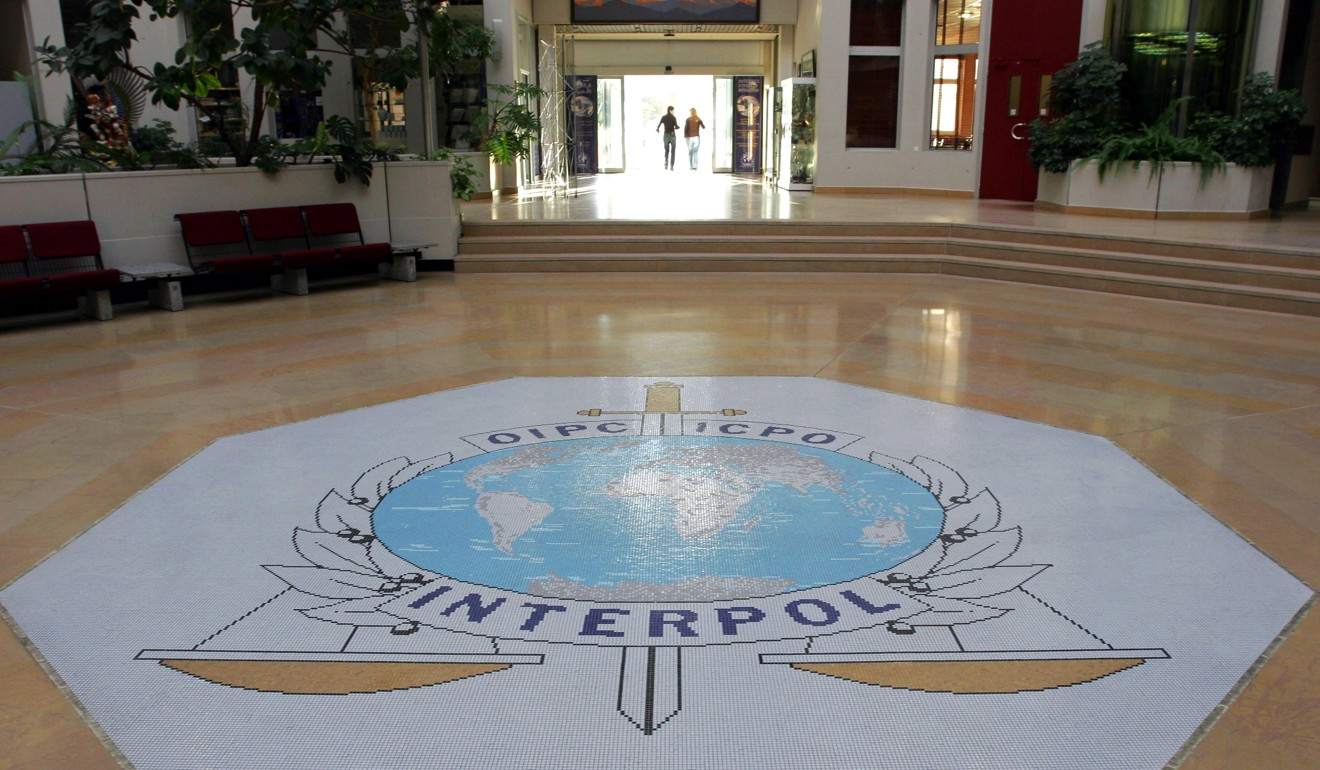
Detention of Interpol’s Meng Hongwei ‘harms confidence in Chinese leaders of global bodies’
Fate of head of global policing body raises fear that Chinese leadership of international organisations will be compromised by domestic priorities
The disappearance and detention of the Chinese president of the global policing body Interpol as part of Beijing’s anticorruption drive is an unprecedented move that will shake the international community’s confidence in Chinese leadership of global organisations, analysts say.
Meng Hongwei, also a vice-minister of public security in China, was placed under investigation by Chinese authorities for allegedly taking bribes and “gravely jeopardising” the country’s ruling Communist Party and police.
In a public security meeting on Monday, officials said the investigation of Meng and his associates for alleged illegal activities “fully showed there was no privilege or exception before the law”.
Interpol said on Sunday that it had received Meng’s resignation, after the organisation asked Chinese authorities for information on his status to “address concerns over the president’s well-being”.
Which Chinese hold top jobs at key international bodies?
Analysts said that the targeting of Meng – who in 2016 became the first Chinese national to head Interpol – showed no one is immune to Beijing’s sprawling anti-corruption campaign but raised broader concerns about the role of Chinese officials as leaders of international organisations.
Paul Haenle, director of the Carnegie-Tsinghua Centre for Global Policy in Beijing, a joint US-China research centre, said Meng’s sudden disappearance had sent shock waves through the international community, lending credence to critics who said China was not ready to take on important leadership roles.
“It would be hard to imagine any other international organisation being OK putting a Chinese national in charge,” he said. “What confidence would they have that this wouldn’t happen again?”
“This incident is unprecedented,” said Marc Lanteigne, a specialist in Chinese politics and international organisations at Massey University in New Zealand.
“It shows the stepped-up effort of Beijing to address what it sees as serious problems of corruption from so-called tigers, or very high-level officials.
It could be a concern that other Chinese officials and other organisations could be subject to the same levels of scrutiny.”
China’s foreign ministry responded during its regular press briefing by insisting the case showed China’s determination to uphold the rule of law, and that Beijing had consistently supported Interpol’s efforts for crime prevention.
Interpol is the world’s largest agency for facilitating police cooperation with 192 member countries, allowing governments to issue international alerts for wanted or missing persons.
Beijing has in recent years increasingly shown interest in engaging with multilateral bodies such as Interpol, with Chinese nationals also taking on senior roles in United Nations agencies and the World Bank.
China is set to soon be the second-largest funder of the United Nations, and currently provides the largest number of peacekeeping troops to the organisation.
But Abigail Grace, a research associate in the Asia-Pacific security programme of the Centre for New American Security, said Meng’s case may raise fears that Chinese officials cannot act independently within these organisations, with no individual “given a free pass” from being subject to Communist Party discipline.

The incident also showed that Beijing made the judgment call that its anti-corruption priorities were more important than anticipated international pressure, she said.
“Obviously, they have the incentive to keep this as under wraps as possible,” Grace said about the lack of transparency over Meng’s detention. “They see this as an internal matter.”
Meng, who was due to lead Interpol until 2020, was first reported missing by his wife, Grace Meng, on Thursday in Lyon, France, the headquarters for Interpol.
She told reporters that Meng’s last text messages to her on Tuesday indicated he was in some type of danger, with a knife emoji and instructions to wait for his call.
Meng had a portfolio of responsibilities after his appointment as vice-minister for security in 2004, including counterterrorism, narcotics control, border control, immigration and international cooperation.
Human rights advocates had warned previously that under his leadership, Beijing would use Interpol to forcibly repatriate Chinese dissidents and fugitives.
“Meng was not long ago elected the Interpol chair, which was considered an honour of China, and should facilitate the Chinese anticorruption policies by catching those fled-overseas corrupt officials,” said Zhu Jiangnan, an associate professor at the University of Hong Kong researching corruption and anti-corruption in China.
“However, with the strong momentum of the ongoing anticorruption enforcement in China today, I guess people should not feel so surprised at anyone being arrested.”
Under Chinese President Xi Jinping, efforts to root out corruption have ensnared individuals at all levels. Meng’s case is a signal from Beijing that its campaign “shows no sign of abating”, said Lanteigne, from Massey University.
Additional reporting by Catherine Wong

